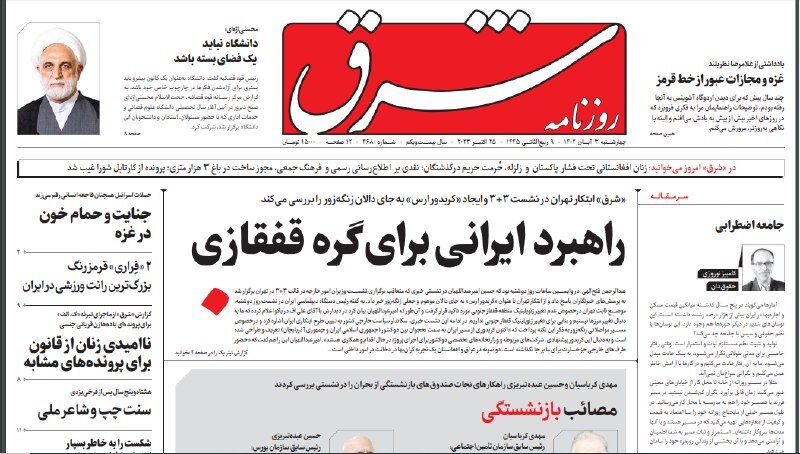Iranian strategy for the Caucasus

In a note, Shargh discussed Iran's initiative for the Caucasus issue and wrote: Hossein Amir Abdollahian, after holding a meeting of foreign ministers (of Turkey, Russia, Azerbaijan, Armenia and Georgia) in the form of 3+3 in Tehran, called Tehran's initiative "Aras Corridor" instead of the illusory and fake Zangezur Corridor.
It seems that this time, Tehran is no longer satisfied with the plan on paper and is working hard. The foreign policy of the 13th government has been able to take a step forward in several aspects regarding the developments in the Caucasus and Karabagh; first, Tehran was able to hold the 3+3 format meeting for the first time at the level of foreign ministers. It has also tried to have an initiative plan to prevent the continuation and escalation of tensions and disputes in the South Caucasus region. Although some experts believe that a corridor plan through Iranian soil has been on the agenda before, the more serious efforts of the government show that now Tehran has an alternative operational plan that can bring a win-win game for all parties.
Kayhan: JCPOA beneficiaries do not give up its corpse either!
Kayhan addressed the JCPOA supporters for imaginary achievements made by the 2015 nuclear agreement. It wrote: The Western-oriented faction and the supporters of sanctions and the JCPOA, who downplayed the increase of Iran's defense power and sought to disarm Iran with the “JCPOA 2 and 3”, do not give up the corpse of the JCPOA and the fake lifting of the arms sanctions as the fruit of the JCPOA. The facts show that the lifting of the arms sanctions has had no relevance to the Western-oriented faction and the beneficiaries of the JCPOA. However, it proves that this deceitful side is also upset about the lifting of the sanctions. The justification of America and Europe's breach of the JCPOA agreement by political activists claiming support for reform and moderation made the enemy more arrogant and caused the sanctions to be doubled. But now the progress achieved without the JCPOA and FATF is based on national capabilities, the rise of rationality and authority in foreign policy and dynamic and inclusive diplomacy.
Farhikhtegan: New oil sanctions against Iran
In a commentary, Farhikhtegan discussed the West’s moves to confront Iran following the Gaza war and wrote: The victory of Hamas in the Al-Aqsa Storm battle and the recent arrival of the sunset clauses of the JCPOA ending the arms sanction on Iran are not events that we expect the West to ignore and use as an excuse to confront Iran. The statement of 46 countries regarding the continuation of arms sanctions, as well as the attempt by American senators to establish a 150-million-dollar fund to support Iran’s oil sanctions under the pretext of Iran’s support for Hamas, are examples of these countermeasures. Of course, some people believe that these measures are a sign of the West’s retreat and not extremism because, after the start of the Gaza war, there is a possibility that Iran and other resistance groups enter the fray. And the Westerners, feeling afraid of this issue, are trying to face diplomatic tension rather than military tension. Of course, these movements cannot be taken seriously because the Americans do not want to increase tension and do not want to get involved in a regional war, and the situation is not such that they can do so.
Arman-e-Melli: America looking for excuse to return to the region
In an article, Arman-e-Melli discussed the re-appearance of America in the region and said: Despite the crimes committed by Israel against the oppressed people of Palestine, this regime has been pretending an image of the oppressed and in this way is trying to attract public opinion, while the history of its anti-human crimes is not hidden from anyone. The start of this war gave America an excuse to enter the region and provide weapons to Israel. If this war continues, America will find an excuse to stay in the region. America was defeated in Iraq and Afghanistan and was forced to withdraw. So America is looking for an excuse to return to the region, and the Gaza war provided them with this excuse.
Leave a Comment